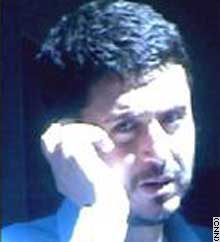Suspected Madrid bombing ringleader killed
Five suspects may have died in Saturday's apartment blast
From Al Goodman
CNN Madrid Bureau Chief
 |  Sarhane Ben Abdelmajid Fakhet was the suspected ringleader of the March 11 attacks in Madrid, according to the Spanish government. |
 |
Story Tools
|
 |  VIDEO |
 Train attack suspects among those killed by blast in Madrid suburb.
 PLAY VIDEO
 Suspected terrorists were holed up in an apartment building.
 PLAY VIDEO
 Bomb found on Spanish rail line may be linked to March 11 Madrid attacks, officials say.
 PLAY VIDEO
|
RELATED |
 Gallery: Madrid suspects blow themselves up
|
|
LEGANES, Spain (CNN) -- A Tunisian man identified by the Spanish government as the ringleader of the March 11 bombings in Madrid was among five suspects who may have been killed Saturday when they blew themselves up as police closed in on their apartment, Spanish authorities said.
The suspects were chanting in Arabic when they set off the blast at the four-story apartment building in the Madrid suburb of Leganes, Interior Minister Angel Acebes said.
One Spanish police officer also was killed and 11 others wounded, Acebes said. Three were in the hospital, one in serious but not life-threatening condition, he said.
With recent arrests and Saturday's deaths, Acebes said, those who made up "the central nucleus" responsible for the March 11 train bombings have been identified and are either detained or dead.
The bodies of the suspected ringleader, Sarhane Ben Abdelmajid Fakhet, a 35-year-old Tunisian; Abdennabi Kounjaa, a Moroccan in his late 20s; and another Moroccan, identified as Asri Rifat Anouar, were found in the wreckage of Saturday night's blast, Acebes said.
The fourth suspect has not been identified, and two suspects apparently got away before police sealed the area, he said.
An Interior Ministry spokesman said Sunday there was a "very high probability" that forensics experts would determine a fifth suspect also was killed.
Fakhet and Kounjaa were among six suspects for whom Spanish authorities issued international arrest warrants after the train bombings that killed 190 people and wounded 1,800 others. (Full story)
Fakhet's body was found with an explosives belt with 2 kilograms (4.4 pounds) of unexploded bombs, Acebes said.
The Interior Ministry spokesman said police investigators believed the fifth suspect could be Jamal Ahmidan, named as one of three key players -- along with Fakhet and Said Berraj -- in the bomb plot.
Berraj was described as a Moroccan with alleged connections to al Qaeda.
Police said Ahmidan rented a farmhouse east of Madrid, where police believe the bombs used March 11 were made. Police found fingerprints and other evidence at the rural dwelling.
Forensic investigators carried five body bags from the blast site after completing their work, the ministry spokesman said.
He said authorities were surprised to find that any of the suspects on the international warrant list were still in Spain.
Authorities were examining whether some or all of the others could still be in Spain, he said.
He could not confirm whether the suspects who may have eluded police Saturday were on the international warrant list. He said investigators weren't sure how many people had been using the apartment.
Police were still checking a vehicle found in an underground parking garage used by the apartment complex, the ministry spokesman said. Police said earlier that they suspected the car was packed with explosives.
Spanish media reported the vehicle contained a bomb and that police defused it.
Saturday's blast at 9 p.m. (2 p.m. ET) in Leganes, a suburb about 10 miles south of Madrid, blew a hole through the second story of the apartment building.
Neighbors said the suspects had moved into the building after the train bombings.
Acebes said Goma 2 Eco explosives -- the same brand used in the March 11 attacks and the unexploded bomb found Friday on a high-speed rail line south of Madrid -- and 200 detonators were found in the apartment. The Goma 2 Eco explosive is widely used in mining.
Spanish authorities have not linked Friday's bomb -- which would have been detonated by a long cable attached to it -- with the March 11 bombs, which were detonated by cell phone.
Eleven of the 15 people charged in the train bombings are Moroccans, and Spanish authorities have identified the Moroccan Islamic Combatant Group as a focus of their investigation.
The ministry spokesman said nothing came of a police search of a home in Granada, 434 kilometers (270 miles) south of Madrid, which a tip said the March 11 suspects planned to use "for logistics purposes."
Granada was the last Arab stronghold in medieval Europe. It was conquered by the Spanish Christian rulers Ferdinand and Isabella in 1492 after flourishing for centuries.